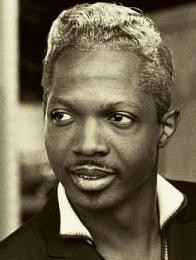Eugene McDuff (September 17, 1926 – January 23, 2001), known professionally as "Brother" Jack McDuff or "Captain" Jack McDuff, was a marvelous bandleader and organist as well as capable arranger, having one of the funkiest, most soulful styles of all time on the Hammond B-3. His rock-solid basslines and blues-
drenched solos are balanced by clever, almost pianistic melodies and interesting progressions and phrases.
He was most prominent during the hard bop and soul jazz era of the 1960s, often performing with an organ trio. He is also credited with giving guitarist George Benson his first break. He appeared on more than 60 albums during his career.
Born Eugene McDuffy in Champaign, Illinois, McDuff began playing bass, appearing in Joe Farrell's group. Encouraged by Willis Jackson in whose band he also played bass in the late 1950s, McDuff moved to the organ and began to attract the attention of Prestige while still with
Jackson's group. McDuff soon became a bandleader, leading groups featuring a young George Benson on guitar, Red Holloway on tenor saxophone and Joe Dukes on drums.
Jackson's group. McDuff soon became a bandleader, leading groups featuring a young George Benson on guitar, Red Holloway on tenor saxophone and Joe Dukes on drums.
McDuff recorded many classic albums on Prestige, including his debut solo Brother Jack in 1960; The Honeydripper (1961), with tenor saxophonist Jimmy Forrest and guitarist Grant Green; Brother Jack Meets The Boss (1962), featuring Gene Ammons; Screamin’ (1962), with alto saxophonist Leo Wright and guitarist Kenny Burrell; and Brother Jack McDuff Live! (1963), featuring Holloway and Benson, which includes his biggest hit, "Rock Candy".
After his tenure at Prestige, McDuff joined the Atlantic label for a brief period, and in the 1970s he recorded for Blue Note. To Seek a New Home (1970) was recorded in England with a line-up featuring blues shouter Jimmy Witherspoon and some of Britain's top jazz musicians of the day, including Terry Smith on guitar and Dick Morrissey on tenor saxophone.
 Decreasing interest in jazz and blues during the late 1970s and 1980s meant that many jazz musicians went through a lean time. But in 1988, with The Re-Entry, recorded for the Muse label, McDuff once again began a successful period of recordings, initially for Muse, then on the Concord Jazz label in 1991. George Benson appeared on his 1992 Colour Me Blue album.
Decreasing interest in jazz and blues during the late 1970s and 1980s meant that many jazz musicians went through a lean time. But in 1988, with The Re-Entry, recorded for the Muse label, McDuff once again began a successful period of recordings, initially for Muse, then on the Concord Jazz label in 1991. George Benson appeared on his 1992 Colour Me Blue album.McDuff spent most of his career in Chicago and New York City and also travelled internationally. He met his wife, Kathy McDuff, while playing at the Artists' Quarter in Minneapolis and moved to Minnesota in 1990. He continued to play at Artists' Quarter, now located in St. Paul, as well as the Dakota Bar & Grill in St. Paul.
Despite health problems, McDuff continued working and recording throughout the 1980s and 1990s, and he toured Japan with Atsuko Hashimoto in 2000. "Captain" Jack McDuff, as he later became known, died of heart failure at his home in Minneapolis, Minnesota, while convalescing from a series of small strokes he had suffered during previous months. He was 74.
On June 25, 2019, The New York Times Magazine listed Jack McDuff among hundreds of artists whose material was reportedly destroyed in the 2008 Universal fire.
(Edited mainly from Wikipedia)
Brother Jack McDuff - organ; Red Holloway - tenor sax; George Benson - guitar; Joe Dukes - drums. Festival gig in France.




